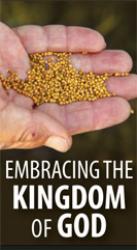
In the days that have stretched into weeks upon weeks during the pandemic, we are learning valuable lessons about ourselves, our relationships and our interactions with the world around us. One of the lessons has to do with the importance of patience and surrender, two related qualities of the spiritual life that also reveal something about the kingdom of God.
The Gospel of Matthew contains a parable from Jesus that is unique in the Gospels. It is the story of the weeds among the wheat (13:24-30), which in Matthew occurs immediately following the more familiar parable of the sower. The story of the farmer generously sowing seed in all kinds of ground is also found in Mark and Luke where the seed symbolizes the message of the Kingdom and the ground symbolizes the various ways in which God’s kingdom does or does not take root.
It is only in Matthew’s version of the sower and the seed that Jesus says the seed symbolizes the people who receive the message. In other words, Jesus is sowing his disciples in the world. Some of these disciples lack staying power when times get tough, some find themselves at odds with cultural values and soon become fruitless and others bear fruit in abundance. It is following this interpretation of the parable where we find the additional parable about the weeds growing among the wheat.
Anyone who farms or has a simple home garden knows that the soil prepared for planting is fertile not just for the intended crop, but also for the weeds that inevitably sprout between our neat rows of vegetables. While farming techniques differ now from the ancient world, and would differ even between climates, the presence of weeds is an age-old dilemma for growers.
Jesus tells his listeners about a man who notices weeds among the crop of wheat he planted. It would be natural for his field hands to pull the weeds so that the wheat could flourish and the harvest would be clean. But Jesus is not giving a lesson in farming; he is giving a lesson for disciples about the kingdom of God. The farmer in Jesus’ story tells his workers “Let them (the weeds and the wheat) grow together until harvest …” (Matthew 13:30).
This is indeed a strange scenario. Wouldn’t the weeds have the potential of choking out the wheat? Wouldn’t a pure crop be preferable? Again, Jesus is reminding us that God’s kingdom is rarely predictable by human standards. We offer several observations.
First, the previous parable in Matthew’s Gospel compared the seeds, the potential crop, to his followers. Now, his followers might well be the wheat. Might we be tempted to want a community that is pure and fruitful in all the right ways? Probably so; it would certainly be easier to thrive in such a community.
Secondly, the weeds in question are assumed to be darnel which often looks very much like wheat until the crop is further along. Jesus is indicating that the harvester (God, in this case) is the one who will be able to tell the difference. It is the job of the harvester to sort it out in the end, determining which growth to burn and which to be gathered for food.
Thirdly, if we are the crop that is sown in the soil of this world, perhaps we are being asked to trust that the One who planted us is giving us what we need to be fruitful even if it is not always easy. Our job is to persist, to patiently grow even alongside those who are so different from us and to surrender to the plan of the one who will ultimately harvest what he has planted.
Catherine Upchurch is the general editor of the Little Rock Catholic Study Bible and contributes to several biblical publications. She writes from Fort Smith.
Please read our Comments Policy before posting.
Article comments powered by Disqus New season of ‘The Chosen’ delayed on streaming sites
New season of ‘The Chosen’ delayed on streaming sites
 Father Keller, oldest diocesan priest, a pro-life champion
Father Keller, oldest diocesan priest, a pro-life champion
 Vatican says abortion, surrogacy attack human dignity
Vatican says abortion, surrogacy attack human dignity
 Iowa basketball superstar supported by Catholic faith
Iowa basketball superstar supported by Catholic faith
 A Catholic You Want to Know: Joan Becker
A Catholic You Want to Know: Joan Becker
 Two gifts after Jesus’ death: Virgin Mary and Eucharist
Two gifts after Jesus’ death: Virgin Mary and Eucharist
 Why we have an altar, and not just a communion table
Why we have an altar, and not just a communion table
 Pope: Wars should be resolved through nonviolence
Pope: Wars should be resolved through nonviolence
 Living relationship with Jesus Christ in the Eucharist
Living relationship with Jesus Christ in the Eucharist
 Crosses: Adversities you could avoid, but are embraced
Crosses: Adversities you could avoid, but are embraced